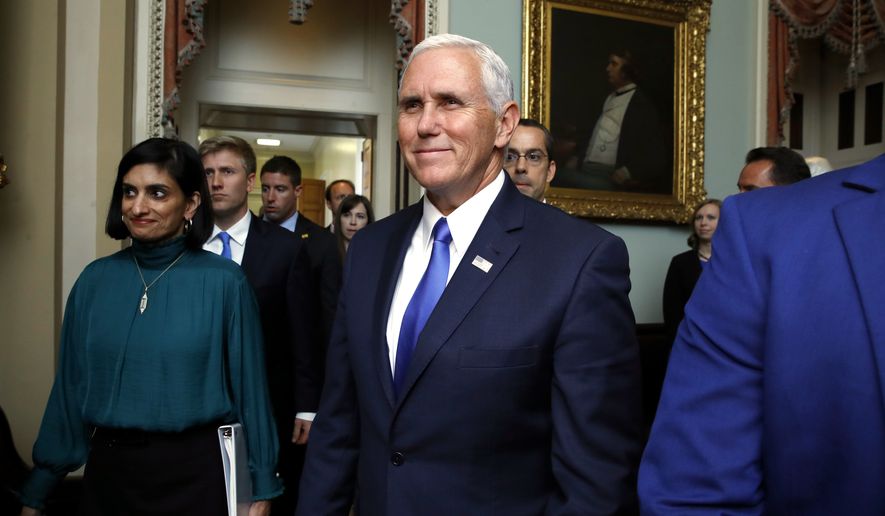The White House and Senate GOP leaders on Tuesday praised a last-gasp bill to repeal Obamacare, signaling a shift from bipartisan efforts to stabilize the markets to a bill that would replace the 2010 law with block grants to the states.
Vice President Mike Pence flew in from New York to prod Senate Republicans into backing the plan by senators Lindsey Graham and Bill Cassidy before a Sept. 30 to kill Obamacare without facing a Democratic filibuster.
“My message today is I want to make sure that members of the Senate know the president and our entire administration supports Graham-Cassidy. We think the American people need this,” Mr. Pence told the traveling press during his flight to Washington.
Majority Leader Mitch McConnell was more cautious, as he searches for 50 GOP votes before lurching into another embarrassing floor debate on health care, though praised sponsors for looking to scrap the Affordable Care Act and devolve power to the states.
“I’ve never felt better about where we’re at,” Mr. Graham, South Carolina Republican, said, standing a few feet from Mr. McConnell.
Under the plan, Obamacare money that pays for an expansion of Medicaid and that subsidizes coverage for many of those who buy insurance on the exchanges would be pooled and instead given to states as block grants. The states would tailor the money to their own health care plans starting in 2020.
Mr. Graham said House Speaker Paul D. Ryan assured him he would fight for passage if the Senate approves the bill.
Mr. Ryan also told Senate leaders that a parallel, bipartisan push to fix the individual insurance market isn’t palatable to conservatives who don’t want to “bail out” insurers or prop up Obamacare, according to source familiar with the talks.
The shift to Graham-Cassidy is enraging Democrats, who thought they’d killed off the GOP’s repeal push and could land a compromise to preserve their signature 2010 law before signups being in November.
Senate Minority Leader Charles E. Schumer argued that prioritizing repeal will “shut down” the bipartisanship that Americans crave, while reversing Obamacare’s coverage gains.
“How about how this affects people?” he said. “Millions will lose coverage.”
Ten governors, split evenly between Republicans and Democrats, dinged the new effort in a letter to Senate leaders, saying they should support the bipartisan effort out of the Senate Health Committee instead.
“Only open, bipartisan approaches can achieve true, lasting reforms,” wrote the group, which included Alaska Gov. Bill Walker, an independent, and Republican Gov. John Kasich of Ohio, whose voices could influence key GOP holdouts in senators Lisa Murkowski and Rob Portman.
Under the Graham-Cassidy plan, states that rejected federal dollars to expand their Medicaid populations under Obamacare would win out, financially, over the coming decade, while states that did expand are generally projected to see cuts.
The American Medical Association urged the Senate to oppose the legislation, saying it likely “would result in millions of Americans losing their health insurance coverage, destabilize health insurance markets, and decrease access to affordable coverage and care.”
It said Congress should focus on the short-term effort to stabilize the markets by funding “cost-sharing” payments that reimburse insurers who lose money on low-income Obamacare customers.
Sen. Lamar Alexander’s health committee is still working on a bill that would fund the payments — something Democrats want — in exchange for letting states take more control over their markets, a win for Republicans.
Though largely supportive of Graham-Cassidy, he said sniping around it and Sen. Bernard Sanders’ push for a government-run, single-payer system had made his job more difficult.
“I’m not a magician. I’m still trying,” Mr. Alexander said.
The repeal push also faces long odds, however.
Sen. Rand Paul of Kentucky says he is a hard “no” on Graham-Cassidy because it leaves too many of Obamacare’s taxes and regulations in place, leaving the GOP vote-counters little room for error.
Ms. Murkowski of Alaska and Sen. Susan Collins, Maine Republican, rejected a limited Obamacare repeal bill in July, citing the type of federal cuts that are reprised in the new bill.
Sen. John McCain, Arizona Republican who also rejected that effort, hasn’t said whether he will support the plan, either.
“I have nothing to say. I have nothing to say,” Mr. McCain told reporters.
His governor, Doug Ducey, endorsed the Graham-Cassidy plan, but the senator also says he doesn’t want to “ram through” a partisan bill.
• Tom Howell Jr. can be reached at thowell@washingtontimes.com.




Please read our comment policy before commenting.